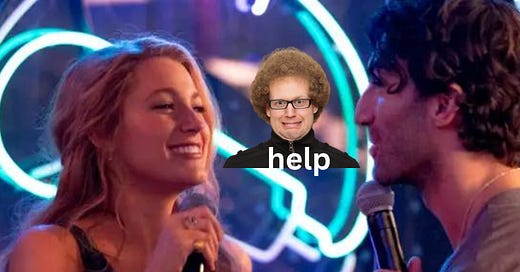Yes, even you can learn valuable career lessons from Blake Lively and Justin Baldoni (primarily about the pitfalls of book-to-film)
Whether we're talking books or movies, launching creative work is a fraught business--particularly when you have to do it in ever-changing circumstances. Here's what you need to remember.
Are you obsessed with the “It Ends With Us” drama? Because I am obsessed with the “It Ends With Us” drama. And so are most of my friends.
Whenever I’ve dropped the words “Justin Baldoni” in the group chat this week, I’ve felt like a lioness tossing a fresh zebra drumstick to her pride. The reactions have been immediate and voracious: oh my GOD, I KNOW. What is WRONG with Blake Lively? What is wrong with HIM? IS there something wrong with him? But if it’s not him, why would someone like Jenny Slate—
It’s August, for heaven’s sake. We’re all stressed about the end of summer, politics, our families, and the future in general. We’re starving for one last stupid gossip binge before September begins. And oh, is the “It Ends With Us” drama a BUFFET.
Please join us at the feast.
I think my fellow book people ought to chow down on this story, too. For a low-stakes Hollywood scandal, it has a surprising amount to teach us: how books get made into films; what works and what doesn’t in the realm of creative PR; how people with the “right” moral principles lose colleagues’ respect nevertheless; etc.
Walk with me. You’ll see.
But first:
In case you have no idea what I’m talking about, let me catch you up.
I’m not talking about the drama within the movie “It Ends With Us.” An adaptation of Colleen Hoover’s bestselling novel about domestic violence, it sounds like a decent-enough entry into America’s venerable tradition of the suffering white-lady gothic, albeit not one I plan to see.1
No: I’m talking about the drama surrounding the movie’s rollout.
In brief: the director/acquiring producer of the movie (Justin Baldoni) and the star/executive producer (Blake Lively) are in the midst of a spectacular passive-aggressive public falling out over nebulous “creative differences.” Baldoni and Lively also play the dysfunctional couple at the center of the movie—he’s the abuser—so there’s also that delicious little meta crunch on top of the sundae.
No one involved has offered any on-the-record intel as to what’s gone down between these two. Whatever it is, however, Hoover and everyone else in the cast – Jenny Slate! Hasan Minhaj! – seem to be on Team Lively. No one took photos with Baldoni at the August 6 premiere. They didn’t mention his name in interviews. They all watched the premiere in a different theater than he did. They seem to have mass-unfollowed him on social media. Only Baldoni’s wife—and the film’s crew—want anything to do with him in public.
Still with me? Okay: the above is issue one of two.
Here’s issue number two: all month, there’s been public outcry over the tactlessness of the “It Ends With Us” PR campaign, particularly as embodied by Lively.
In interviews, she’s made promises of girlypop rom-com fun (“bring your friends, wear your florals”) — for a film which, to remind, is about spousal abuse. She’s blown off reporters’ questions about victims and survivors, choosing instead plug her new hair-care line and her husband’s unrelated superhero movie.
On the whole, Lively’s spent the entire month acting like Marie Antoinette reincarnate in a Baywatch babe’s body. Her blithe cluelessness has so enraged some internet users that they’ve dug up and run all kinds of retrospectives on her past poor judgment. There’s been a lot of it, to be fair: the plantation wedding; that time she bullied the Finnish reporter; the Woody Allen movie; the Harvey Weinstein defense; the enmity with Leighton Meester; the enmity with Anna Kendrick. Oy—I could go on.
Some people will tell you these two issues—the Baldoni-Lively feud and the insensitive marketing campaign—are related.
The people who will tell you this are on Team Baldoni. They say this is all a clash over fundamental values: Baldoni sees “It Ends With Us” as a serious issue movie; Lively wants to pretend it’s a rom-com, thus duping the maximum possible number of female theatergoers. Baldoni’s doing it for the victims; Lively’s doing it for herself.
The pro-Lively camp holds that no, these are in fact separate issues. She and the rest of the staff detest Baldoni because he’s a detestable person. According to these “sources”—the only name by which they ever go in TMZ and Page Six—Baldoni is a prissy fussbudget mansplainer who might or might not have fat-shamed his lead actress and held a kiss too long during filming. So that’s their problem—not his commitment to helping survivors.
Why on Earth does any part of the above have anything to do with my career in book publishing?
Let me tell YOU, Bernice.
First: it’s a great case study in book-to-film adaptation and its pitfalls.
What looks like a simple human story—a creative conflict between two people—is in fact almost certainly an iceberg tip arising from the corporate complexities of book-to-film adaptation.
Keep reading with a 7-day free trial
Subscribe to How to Glow in the Dark to keep reading this post and get 7 days of free access to the full post archives.




